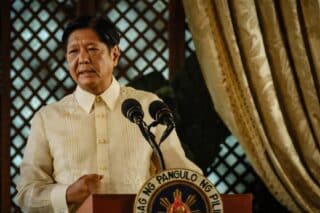Lost in popular radar is a little-known factoid that the airport of Mati in Davao Oriental was once named after Imelda Romualdez Marcos. That does not raise eyebrows, knowing who the province’s political elite was in the 1970s and their proximity to the conjugal dictators.
In 1978, Davao Oriental’s governor was Francisco Rabat, a chummy pal of Ferdinand Marcos. Their wives were as close. Edith Nakpil Rabat was a name associated with history, Ambeth Ocampo reminds us. She was Miss Philippines 1956 and was the daughter of Miss Philippines 1926 Anita Noble. Edith’s father Juan Nakpil, National Artist for Architecture, was the son of Gregoria de Jesus, Andres Bonifacio’s widow who was wed to the Katipunan composer Julio Nakpil.
At the time the airport was named after the conjugal half, it was the second such airport named after close Marcos affinities, the other being the Daniel Z. Romualdez Airport of Tacloban. That distinction did not endure. As the Imelda airport catered only to the private light planes of the rich, the decline of logging and copra contributed to its demise.
But there was more. The terminal and apron sat on land owned by the Rabats, while the runway was spread on Rocamora family land. No deeds of donation were executed. Deserted today, it is simply named Mati airport. We heave sighs of relief, knowing the superfluity then, during martial law, of naming towns, universities and highways after the Marcoses, even Imelda’s mother.
So much ink is being spilled by a signature campaign to have the Ninoy Aquino International Airport revert back to its old name of Manila International Airport. The premise of the argument is fallacious, that it is the only airport in the world named after a person. To be polite, I can understand the obliviousness but not in the digital age where wisdom can be gleaned virtually.
They can review a few: Charles de Gaulle (Paris), Ronald Reagan (Washington, DC), Indira Gandhi (New Delhi), Kemal Atatürk (Istanbul) airports and the world’s busiest, the JFK of New York. Even Abraham Lincoln has an airport named after him in Springfield, Illinois. Closer to home is the Soekarno-Hatta in Jakarta, named after the first Indonesian president and vice president, Sukarno and Mohammad Hatta.
Saudi Arabia’s airports in Jeddah, Riyadh and Dammam are each named after a deceased monarch. But it is not only kings and presidents who get to have airports named after them. There is the Brazilian bossa nova songwriter Antonio Carlos Jobim, after whom the international airport in Rio de Janeiro is named. Cariocas refer to their airport with the musician’s term of endearment—the Tom Jobim.
Few may know of the Frédéric Chopin airport in Prague. In Palermo, Italy, the Aeroporto Internazionale Falcone e Borsellino is named after two judges who fought the Mafia, Giovanni Falcone and Paolo Borsellino. Florence named its airport the Amerigo Vespucci, the explorer after whom America derived its name (Latin, Americus). Of course, there’s the Leonardo da Vinci of Rome. An airport named after Genghis Khan and spelled in Standard Khalkha Mongolian is the Chinggis Khaan International Airport in Ulan Bator.
There is an airport named after new saint Mother Teresa. In 2001, four years after her death, her native Albania renamed Tirana international airport the Nënë Tereza. Also of popular identity is the Lyon-Saint Exupéry Airport in France of “The Little Prince” fame and that mystical tale of the desert-stranded pilot, mirroring the life of the aviator Antoine de Saint-Exupéry who disappeared at sea.
Speculators theorize the signature campaign as a possible prologue to a Marcos return. That is missing an axiomatic question: Do we still regard the quintessential “trapo” Ninoy a hero deserving of the airport name? Many have ceased to accord him that regard. Democracy died with Marcos—all martial law murders are primordial reminders. The airport name is a commitment to memory.
How about renaming it Never Again International Airport? It’s a “hugot line” and the acronym remains Naia. Just to be idiotic about it.


